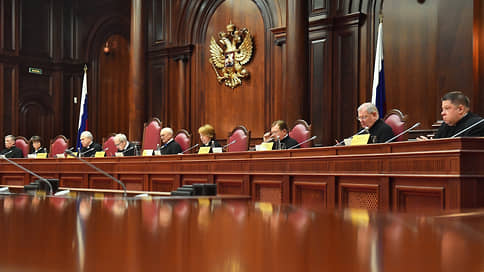KS accused the Duma of delaying the execution of court decisions

The number of unfulfilled decisions of the Constitutional Court (COP) is gradually reduced, follows from the annual report prepared by the KS Secretariat. To speed up this process, they believe in court, an additional mechanism is needed that will allow the government to return to the refinement of bills submitted to the State Duma in fulfillment of the decision of the Constitutional Court, but rejected by parliamentarians.
The COP once again recorded a decrease in the total number of decisions awaiting execution. As of the end of April 2025, there were 40 of them (against 44 in 2024), follows from the report of the court of the court, published on the website of the KS. This is partly due to the fact that the court issued significantly fewer resolutions on the recognition of the norms that are not relevant to the Constitution, it is said in the report: out of 59 decisions adopted in 2024, only 19 require a change in legal regulation, more often the CS was limited to adjusting law enforcement practice (see schedule). For comparison: in 2023, the KS adopted 60 decisions, and 28 of them required legislative changes.
According to the law, the government must introduce a bill to the State Duma in fulfillment of the decision of the Constitutional Court no later than six months after the publication of the court ruling, and in general, the White House cope with its task, the report said.
But for the Duma, the period of consideration of such initiatives has not been established, therefore, the main problems with the implementation of the solutions of the Constitutional Court arise at this stage.
The greatest concern is caused by situations with the bills rejected for one reason or another, since there is no mechanism for further work on them (including the setting deadlines for their re -introduction to the State Duma). “It seems that such work, as in the case of the initial development of the draft federal law, should be carried out by the Government of the Russian Federation, which does not exclude the possibility of introducing bills by other subjects of the legislative initiative, including representatives of parliament,” they suggest in the Constitutional Court. To make new projects there, it is considered optimal to establish a six -month period from the date of deviation of the first bill.
In total, 27 federal laws were adopted in 2024 in fulfillment of the decision of the Constitutional Court, the court was calculated in the court secretariat. 19 of them provided for the execution of decisions of 2023, two more-from 2022, and the rest-decisions of 2015, 2020, 2021, 2022 and 2024. Now at various stages of the legislative process in the Duma there are also 27 bills, while five of them relate to the solutions of the Constitutional Court, adopted back in 2010-2015, and five from 2016 to 2020.
Some initiatives remain without movement for years: at least six such projects, the last decision was made more than a year ago.
In exceptional cases, the report is noted in the report, the need specifically stipulates the need to make legislative changes – such as, for example, in the decision on the right of children of rehabilitated victims of political repression for housing, which was adopted in 2019, but has not yet been fulfilled at the federal level. But the relevant laws were adopted in some regions, in particular in the Arkhangelsk region, Chuvashia, Khanty-Mansiysk district. Failure to comply with the deadlines for the execution of the decision by the federal legislator does not relieve responsibility from the regions, the KS emphasizes.
However, “in general, the situation with the implementation of the Constitutional Court of Constitutional Court can be appreciated positively”, state in court, especially since the lack of changes in regulatory regulation does not prevent the direct action of the KS decisions. However, a considerable part of the appeals received in the Constitutional Court is still associated with “improper accounting” of law enforcement officers previously formulated by the court.
The reproach of the Constitutional Court to the parliament is primarily in the absence of systematic work on the execution of court decisions, said Ivan Briloksky, head of the Center for Constitutional Justice: editing is carried out situationally and often do not consistent with each other. Perhaps you should think about the practice of speeches by the Chairman of the Constitutional Court in front of the chambers of the Federal Assembly, the expert argues. Well, the implementation of the KS practice by courts is a “separate pain”, Mr. Brikulsky is recognized: the courts often simply do not understand what it was established by the Constitutional Court, limited to formal accounting of the resolving part of the decision.








